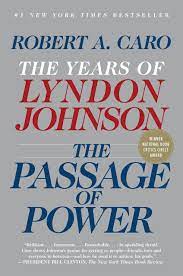
Passage of Power
I realized something around six hours into Passage of Power. I was enjoying the book less on its own merits (though it has many!) and more in the same way that I enjoy the fourth or fifth season of a show that I've grown to love and look forward to — that, even if the narrative was a little overpaved at times and the writer's room had little left up their sleeves with which to surprise and awe me, it bestowed a comfort and ease that felt a little bit like homecoming.
I had listened, after all, to around ninety hours of Caro talk about LBJ before starting this book; here are another thirty.
I think Caro engenders this feeling a little deliberately. There are more references to his previous volumes in Passage of Power than in the previous three books combined (which makes sense, of course!), and the overriding feeling one gets from reading this book is less a sense of interest in the story and more a sense of how the story situates itself to everything that you now know came before it.
Caro is at his most powerful when he tells you a story on multiple levels. Master of the Senate ↗ is a book about LBJ in the senate, sure, but it is also a history of the Senate itself, and the book is most interesting when those two stories inform and enhance each other. The Path to Power is a book about LBJ's rise to power, sure, but it is more than anything — more than LBJ! — a book about Texas hill country and informed my thinking of the Lone Star State far more than it informed my thinking about LBJ.
Means of Ascent ↗ struggled (by Caro terms — it was still a lovely read) comparatively because besides a few vignettes (Coke Stephenson chief among them) it had few stories to tell. And here, too, Caro struggles a little: he clearly is most interested in talking about the Kennedy family and the remarkable transition between the two divergent Democratic demigods, but there's a little bit less of an impact. The camera is swooping less; it reads more like an incredibly well researched documentary.
Which is not to say I didn't enjoy myself. But the enjoyment was less of a genre-breaking sense — a "oh, this is simply one of the best things I've ever read, sense", a la Means of Ascent — and more of, as aforementioned, comfort food. I can recommend the first and third volume of this beautiful, heroic effort to anyone; I don't recommend the second (if they liked the first, they'll read it anyway) and I probably won't recommend this.
And, of course, I eagerly await the fifth. What an immense effort: thirty years spent writing about one man's life.
© 2023 Justin Duke • I hope you're wearing your favorite sweater.